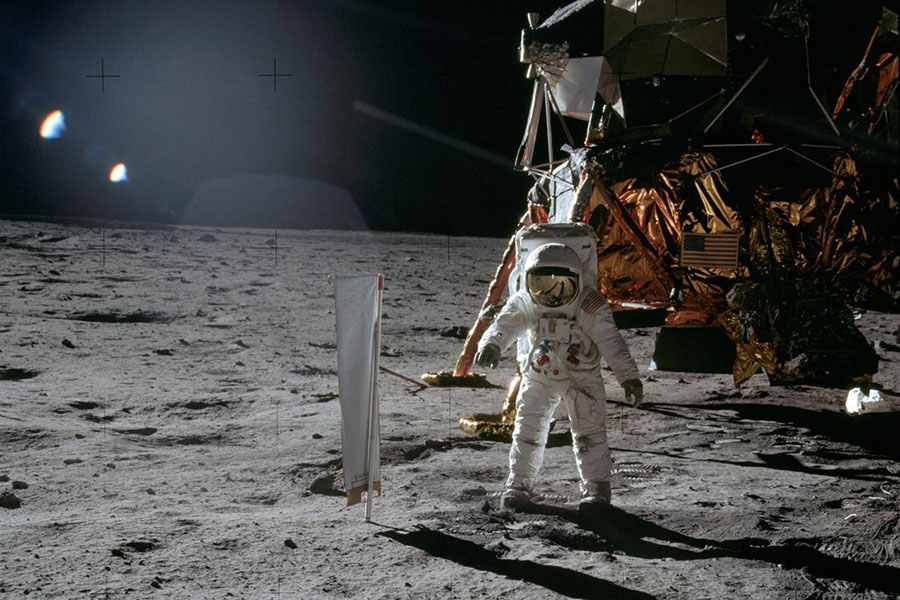Physics professor shares insight into the Apollo 11 Lunar Landing
This Saturday, July 20, 2019, marks the 50th anniversary of the Apollo 11 lunar landing. Sergei Lyuksyutov, Ph.D., a physics professor here at The University of Akron (UA), has a theory as to how the United States made it to the moon—and it has nothing to do with internet conspiracy.
“Our great country mobilized all possible resources and hired the best scientists, engineers, and contractors on the planet,” Lyuksyutov says. “But it was not about the job! It was the great American spirit that landed Neil Armstrong and Buzz Aldrin on the Sea of Tranquility that day.”

Astronaut Edwin E. Aldrin, Jr., Lunar Module pilot, is photographed during the Apollo 11 extravehicular activity (EVA) on the lunar surface. In the right background is the Lunar Module "Eagle." On Aldrin's right is the Solar Wind Composition (SWC) experiment already deployed. This photograph was taken by Neil A. Armstrong with a 70mm lunar surface camera. (c) NASA on The Commons
Lyuksyutov takes personal interest in the lunar landing. He is a graduate of Moscow Institute of Physics and Technology (MIPT), regarded by the CIA as a “Russian Rocket College” during the Cold War era. But his experience with outer space doesn’t end there. Since 2010, Lyuksyutov has worked with NASA on a number of research projects. At present, he is focused on the study of the Venusian atmosphere, researching the “runaway Greenhouse effect on Venus.”
Regarding the Space Race, Lyuksyutov explains that the gross domestic product/purchasing power parity (GDP/PPP) of the United States to the Soviet Union was approximately 5:1 in favor of the U.S. during the 60s. He believes this set the United States up for a win in the race to the moon; however, the Soviets already had a number of space travel success stories.
“The Soviet Union was the first to send a satellite into space, the first to send a human into space, and the first to conduct extravehicular activity and docking in space,” Lyuksyutov says. He contends that ordinary Soviet citizens were simply unmotivated toward a moon landing compared to the zeal of the States.
When asked about the importance of a landmark like the Apollo 11 success, Lyuksyutov says, “The end of the Apollo program was the end of an era in Space Exploration.” But, he continues, it was also a new beginning. “International human expeditions shall land on Mars before 2050,” he declares.
As mankind’s venture to Mars approaches, Lyuksyutov remarks, “Space exploration is not about prestige or ideology, or who is the best of the best. It is about us. Should we survive as a species, we have to move forward into new frontiers.”
Since joining UA in 2000, Lyuksyutov has reached new frontiers of his own. “UA is my home now. I must admit, I was trained as a scientist, not as a teacher,” he says. But Lyuksyutov has found pride in his career here at UA.
“I am very proud of all my former graduate students because they have landed good jobs,” he remarks, citing one former doctoral student from Ukraine who is now a CEO of a startup company in San Francisco.
Whether it is a small step for man or a giant leap for mankind, Lyuksyutov gets it: it is the spirit that counts.
Story by Madeline Myers.
Media contact: Lisa Craig, 330-972-7429 or lmc91@uakron.edu.
